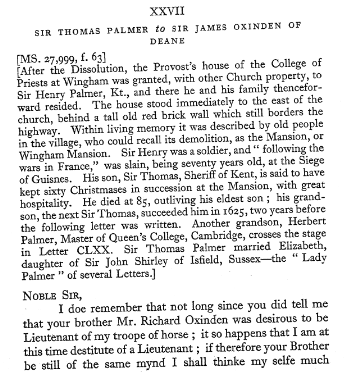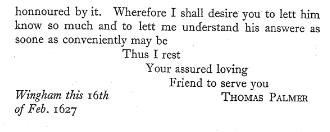Difference between revisions of "MRP: Letter from Sir Thomas Palmer to Sir James Oxinden of Deane"
| Line 1: | Line 1: | ||
= Letter from Sir Thomas Palmer to Sir James Oxinden of Deane = | = Letter from Sir Thomas Palmer to Sir James Oxinden of Deane = | ||
| − | + | NOBLE SIR, | |
| − | + | I doe remember that not long since you did tell me that your brother Mr. Richard Oxinden was desirous to be Lietenant of my troop of horse; so it happens that I am at this time destitute of a Lieutenant: if therefore your Brother be still of the same mynd I shall thinke my selfe much honnoured by it. Wherefore I shall desire you to lett him know so much and to lett me understand his answere as soone as conveniently may be | |
| + | |||
| + | Thus I rest | ||
| + | Your assured loving | ||
| + | Frend to serve you | ||
| + | THOMAS PALMER | ||
| + | |||
| + | Wingham this 16:th | ||
| + | of Feb. 1627 | ||
---- | ---- | ||
''Notes'' | ''Notes'' | ||
| Line 9: | Line 17: | ||
'''Sir Thomas Palmer, living in 1629''' | '''Sir Thomas Palmer, living in 1629''' | ||
| − | Sir Thomas Palmer was | + | Sir Thomas Palmer was the grandson of Sir Thomas Palmer (1540-1626), who was the third son of Sir Henry Palmer of Wingham, Kent. He was married to Elizabeth Shirley, daughter of Sir John Shirley of Isfield, Sussex, who is referred to in other letters published in D.K. Gardiner (1933) as "Lady Shirley" (for example, XXXX), |
| + | |||
| + | The Palmer family's residence in Wingham dates to the purchase by Sir Henry Palmer of the grant of the college of Wingham, following the dissolution of ecclesiastical property, which Sir Henry and later Palmers made their seat. D.K. Gardiner states in her notes to the above letter that "the house stood immediately to the east of the church, behind a tall old red brick wall which still borders the highway. Within living memory it was described by old people in the village, who could recall its demolition, as the Mansion, or Wingham Mansion." | ||
Hasted records that Sir Thomas Palmer's grandfather was well known for his hospitality at his mansion, a custom which, from the correspondence of Sir James Oxinden and his son Henry Oxinden of Deane, appears to have continued to the grandson's residence at the mansion in Wingham. | Hasted records that Sir Thomas Palmer's grandfather was well known for his hospitality at his mansion, a custom which, from the correspondence of Sir James Oxinden and his son Henry Oxinden of Deane, appears to have continued to the grandson's residence at the mansion in Wingham. | ||
| Line 23: | Line 33: | ||
'Parishes: Wingham', The History and Topographical Survey of the County of Kent: Volume 9 (1800), pp. 224-241. URL: http://www.british-history.ac.uk/report.aspx?compid=63558 Date accessed: 11 September 2011 | 'Parishes: Wingham', The History and Topographical Survey of the County of Kent: Volume 9 (1800), pp. 224-241. URL: http://www.british-history.ac.uk/report.aspx?compid=63558 Date accessed: 11 September 2011 | ||
Wikipedia article [Thomas Palmer (http://en.wikipedia.org/wiki/Thomas_Palmer_%28High_Sheriff%29high sheriff)] | Wikipedia article [Thomas Palmer (http://en.wikipedia.org/wiki/Thomas_Palmer_%28High_Sheriff%29high sheriff)] | ||
| − | "Palmer, Thomas (1540-1626)". Dictionary of National Biography. London: Smith, Elder & Co. 1885–1900 | + | "Palmer, Thomas (1540-1626)". Dictionary of National Biography. London: Smith, Elder & Co. 1885–1900 |
| + | |||
| + | ---- | ||
| + | |||
| + | == Images from D.K. Gardiner (1933:34-35) == | ||
| + | |||
| + | [[File:LETTER_STP_SJO_16021627_DEGardiner_1933_P34.PNG]] | ||
| + | |||
| + | [[File:LETTER_STP_SJO_16021627_DEGardiner_1933_P35.PNG]] | ||
| + | ---- | ||
Revision as of 11:15, September 11, 2011
Letter from Sir Thomas Palmer to Sir James Oxinden of Deane
NOBLE SIR,
I doe remember that not long since you did tell me that your brother Mr. Richard Oxinden was desirous to be Lietenant of my troop of horse; so it happens that I am at this time destitute of a Lieutenant: if therefore your Brother be still of the same mynd I shall thinke my selfe much honnoured by it. Wherefore I shall desire you to lett him know so much and to lett me understand his answere as soone as conveniently may be
Thus I rest
Your assured loving
Frend to serve you
THOMAS PALMER
Wingham this 16:th
of Feb. 1627
Notes
Sir Thomas Palmer, living in 1629
Sir Thomas Palmer was the grandson of Sir Thomas Palmer (1540-1626), who was the third son of Sir Henry Palmer of Wingham, Kent. He was married to Elizabeth Shirley, daughter of Sir John Shirley of Isfield, Sussex, who is referred to in other letters published in D.K. Gardiner (1933) as "Lady Shirley" (for example, XXXX),
The Palmer family's residence in Wingham dates to the purchase by Sir Henry Palmer of the grant of the college of Wingham, following the dissolution of ecclesiastical property, which Sir Henry and later Palmers made their seat. D.K. Gardiner states in her notes to the above letter that "the house stood immediately to the east of the church, behind a tall old red brick wall which still borders the highway. Within living memory it was described by old people in the village, who could recall its demolition, as the Mansion, or Wingham Mansion."
Hasted records that Sir Thomas Palmer's grandfather was well known for his hospitality at his mansion, a custom which, from the correspondence of Sir James Oxinden and his son Henry Oxinden of Deane, appears to have continued to the grandson's residence at the mansion in Wingham.
Sir Thomas Palmer (d. 1626)
Sir Thomas Palmer (d. 1626) had been knighted on the expedition to Cadiz in XXXX and made baronet in 1621. His three sons were Sir Thomas, Sir Roger, and Sir James Palmer (d. 1657). The second son, Sir Roger Palmer, was master of the household to Charles I. According to Hasted, his eldest son predeceased his father, and the mansion at Wingham was inherited by his grandson, also Sir Thomas Palmer, who appears to be the Sir Thomas Palmer writing to Sir James Oxinden in February 1627.
Sir Thomas Palmer (d. 1626) published ‘An Essay of the Meanes how to make our Travailes into forraine Countries the more profitable and honourable,' (London, 1606), which would be interesting to examine in the context of Sir George Oxenden's later travels
Sources for notes
'Parishes: Wingham', The History and Topographical Survey of the County of Kent: Volume 9 (1800), pp. 224-241. URL: http://www.british-history.ac.uk/report.aspx?compid=63558 Date accessed: 11 September 2011
Wikipedia article [Thomas Palmer (http://en.wikipedia.org/wiki/Thomas_Palmer_%28High_Sheriff%29high sheriff)]
"Palmer, Thomas (1540-1626)". Dictionary of National Biography. London: Smith, Elder & Co. 1885–1900

